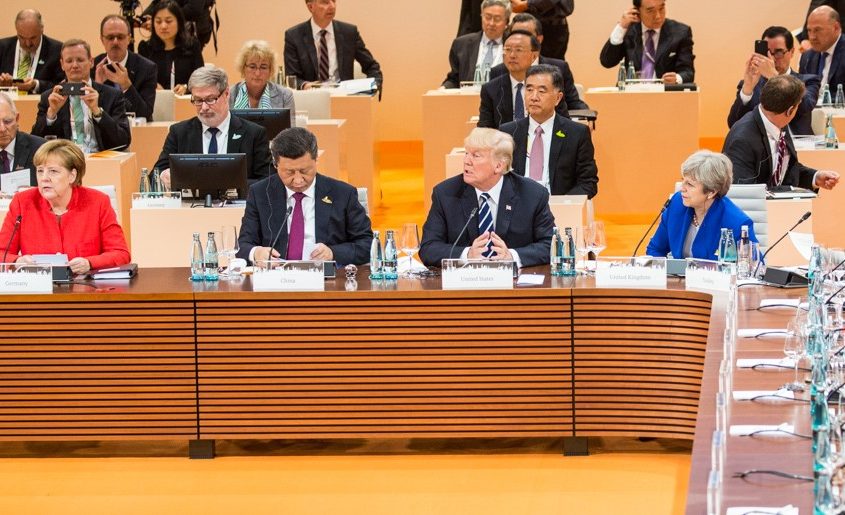
Official White House Photo by Shealah Craighead
China Backlash

Isabella Mekker
Research Intern
Isabella Mekker was a research intern at AICGS for the spring of 2019. She writes articles for the AICGS website, conducts research for current projects and resident fellows, manages databases, operates the front desk, and helps to organize and document events.
Ms. Mekker is currently pursuing a Master’s degree in International Affairs at George Washington University’s Elliott School of International Affairs, with a focus on International Security and Global Gender Policy. Her current research interests focus on security and development policy, the European Union, and the role of China in the future of international affairs.
Prior to pursuing her Master’s degree, Isabella received a Bachelor’s degree in Political Science from Clark University. Isabella has spent time living in Beijing, China, where she was a student for four years and an intern at a healthcare nonprofit for several months. She has also lived and studied German in both Vienna and Munich.
Toward a Transatlantic Agenda?
The rise of China has become a contentious issue for international relations in recent years. While both sides of the Atlantic see the rise of China as an area of potential collaboration, there is a lack of consensus on the methods of doing so. Europe has largely formed its China policies with the view of China as a strategic competitor, whereas the United States seeks to challenge and change China. The question becomes whether China will further divide the transatlantic relationship or serve as a facilitator for increased cooperation. On May 9, 2019, AGI/DAAD Research Fellow Noah Barkin presented his findings on the future of transatlantic relations with regard to the China challenge.
Europe’s Shift on China
- Europe has slowly begun to shift its views and policies toward China, which could mean that there is more room for agreement with the United States.
- One example of this shift is the BDI’s recent change in language when referring to China, labeling it a “strategic competitor” whereas before they had been more reserved.
- Largely as a result of pressure from the United States, Europe has begun to acknowledge the emerging issues with China.
- These issues include:
- Treatment of Western companies in China,
- Chinese investment in Western companies and infrastructure, specifically with regard to technology,
- The Belt and Road Initiative’s spread of political influence and debt in the developing world,
- The emergence of a Chinese surveillance state, both in China and abroad,
- Human rights concerns, specifically the treatment of the Uighur population in Xinjiang, and
- Military buildup in the South China Sea.
- The EU also recently acknowledged 5G security risks, signaling a common approach with the United States, as well as with regard to industrial and competition concerns.
- There is a lot of anxiety in the EU on working with Trump on China policy, and there is a lot of confusion with the Trump administration’s messaging.
- This is largely because of uncertainty in working with the United States: the EU and U.S. share similar concerns but the U.S. will not work with the EU.
- The United States is impatient with Europe on dealing with the China issues but the EU is frustrated with the United States’ tactics.
Trump’s China Policy
- There are arguably three outlooks within the Trump administration regarding China:
- Hawkish pragmatists value dialogue with the EU, include organizations such as the Department of Defense,
- Ideologues see this as a challenge of civilizations and do not want to waste time finding a common policy with the EU; this group includes Peter Navarro, and
- Trump: more about getting the “win.”
- The Trump administration has made a habit of sending mixed messages about China, including through public threats, private ultimatums, tweets, and constructive closed-door discussions.
- Many of these mixed messages undermine the administration’s existing policies.
- Obstacles within the Trump administration are a lack of attention from high-level officials and a lack of consensus on what the priorities are for transatlantic relations.
Transatlantic Dialogue
- There has been a flurry of meetings in recent months on China issues, specifically focusing on the Belt and Road Initiative and 5G.
- The United States and Germany have been holding biannual meetings on China since 2016.
- The “Five Eyes” intelligence network of five English-speaking countries has joined forces with Japan and Germany to establish an information sharing network against Chinese influence.
- The United States has begun appointing a number of China experts at U.S. embassies across Europe.
- There have been U.S.-EU-Japan trilateral talks about China since 2017.
- The most recent NATO meeting in 2019 had some discussions focused on China.
- Nevertheless, while these dialogues are currently happening, the focus on China needs to move away from just discussions within Asia -focused communities in the United States and the EU; we need to include China in the broader policy discussions on both sides of the Atlantic.
Transatlantic Agenda
A transatlantic agenda should include cooperation across a variety of areas including:
- The Belt and Road Initiative: BRI has sought to broaden China’s connections with the developing world, so a transatlantic strategy could offer developing countries an alternative to China.
- The U.S. and EU specifically could offer infrastructure projects and help these countries avoid debt traps.
- Currently there is the EU Connectivity Strategy and The Build Act in the United States, which shows that there is overlap and room to cooperate on a strategy to combat China’s influence in development.
- Nevertheless, the United States has been trying to get the EU to condemn the BRI but the EU does not necessarily see China’s investment in development as a negative thing.
- Investment Screening: Develop a common approach to protect against Chinese acquisition of sensitive technology companies.
- There are concerns about implementation and whether the EU can really adapt its policies to China’s growing influence.
- Data and Artificial Intelligence: Agree on a set of common standards and rules for data and artificial intelligence to respond to China’s big data surveillance.
- The United States agreeing to work with OECD on this is a signal of a step in the right direction.
- 5G and Emerging Technologies: Should develop bullet-proofing telecoms infrastructure and supply chains against possible Chinese espionage and sabotage.
- The United States has a vested interest in finding alternatives to Huawei but this has not really gotten far.
- This will require extensive investment from the transatlantic relationship to try and develop competitive technologies.
- Trade: Focus on strengthening the transatlantic trade relationship in order to push back cooperatively against China’s unfair trade practices
- There are big differences on what to include in trade negotiations, for example agriculture, which has led to a lack of consensus.
- There is no patience regarding WTO reforms on the U.S. side, but the Germans have been talking with China about reforms and trade.
- Trump and possible auto tariffs will be a challenge to this objective.
What Stands in the Way of a Strong Transatlantic Relationship?
- The EU thinks the United States is being too confrontational and has a belligerent attitude.
- The United States thinks the EU is being too reserved and that there is a lack of leadership.
- China policy creates a significant divide between the two, because the United States wants to change China and the EU wants to deal with China.
- The transatlantic relationship, in general, has a lot of other issues (trade agreements, for example), that stand in the way of cooperation on China.
- Europe has benefitted from the United States’ hardball tactics, but still enjoys the status quo.
- There are fragmentations within the EU, such as Brexit and Central European countries.
The Future
- There are many lingering questions about the future, such as:
- After a U.S.-China trade deal, will Trump go after Europe?
- Where will Europe end up standing with 5G?
- Will Beijing deliver on pledges agreed upon at the EU-China summit?
- How will the U.S. export controls on emerging technologies, which are targeted at China, impact Europe?
- Will the next European Commission and Merkel’s successor prioritize China on the agenda?
- What role will China play in the upcoming U.S. election campaigns?
- There has been a lot of talk about foreign policy in election campaigns, Democrats primarily focusing on the China issue by strengthening alliances.
While there is bipartisan agreement for the most part on China, the tone would likely change and more emphasis would be placed on the transatlantic relationship should a Democratic candidate win in 2020.








